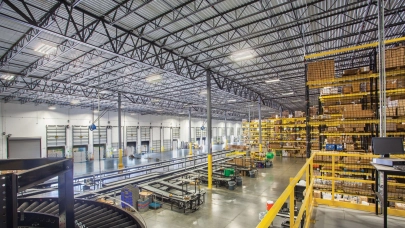
Răzvan Nica, Managing Partner BuildGreen, talked to Property Forum about the building certification trends and the company’s development of the CarbonTool platform, which helps property players meet their decarbonisation objectives.
What have been some of the business highlights of BuildGreen during 2024?
BuildGreen experienced a remarkable year in 2024, marked by significant accomplishments that reinforce its leadership in the sustainability and green certification sector. Central to this success is the adoption and advancement of the CarbonTool platform, which has become an important resource for businesses striving to meet complex decarbonization and ESG compliance objectives.
In addition to technological advancements, BuildGreen has expanded its green certification portfolio, providing expertise in standards like BREEAM, LEED, and WELL. The company has certified over 400,000 sqm of real estate projects, including office buildings, residential developments, retail spaces, and industrial facilities.
Another noteworthy development is BuildGreen's expansion into ESG advisory and decarbonization services, which have become priority areas for many clients. These services extend beyond certifications, offering clients comprehensive roadmaps for achieving long-term sustainability goals, such as net-zero emissions. BuildGreen's approach focuses on tailored strategies, from reducing carbon operational footprints to improving energy efficiency and integrating renewable energy solutions.

Răzvan Nica
Managing Director
BuildGreen & Carbon Tool
What are some of the trends recorded in the green certification and decarbonization market?
One major trend is the adoption of nZEB standards, which prioritize energy efficiency and renewable energy integration. Heat pumps are replacing gas heating as the preferred solution for reducing emissions, signalling a broader transition toward decarbonization.
BREEAM and LEED standards will be updated to stricter levels by mid-2025, with new performance thresholds for energy use, carbon reduction, water efficiency, and sustainable materials. Developers will be required to meet these enhanced criteria, pushing the industry toward greener practices.
Sustainability has expanded beyond individual assets, with companies now integrating ESG policies across their entire operations. In other words, sustainability in real estate has moved from being a project-specific goal to a core business strategy.
What has been the feedback you got from property companies regarding CarbonTool?
In 2024, CarbonTool introduced version 1.1, marking a significant advancement in its development. This update featured advanced analytics, an enhanced user interface, and greater flexibility, all designed to address the diverse and complex needs of businesses facing sustainability and regulatory challenges.
The updates in version 1.1 were also directly informed by client feedback and the need for tools that address real-world challenges. For instance, the analytics functionality has been expanded to provide more in-depth insights into emissions across operations, enabling businesses to identify specific areas for improvement. The user interface has been streamlined to ensure that teams, regardless of technical expertise, can easily access and utilize the platform’s features.
The response from property companies regarding CarbonTool has been exceptionally positive, with many commending its intuitive design and its capacity to simplify intricate processes such as emissions tracking, reporting, and management. These companies have particularly appreciated its utility in helping them adhere to rigorous regulatory frameworks like the Corporate Sustainability Reporting Directive (CSRD) and ISO 14064, thereby enabling them to meet compliance requirements more effectively and confidently.
A standout feature is CarbonTool’s integration capabilities, which enable seamless data exchange among developers and suppliers. This functionality not only streamlines workflows but also ensures all stakeholders have access to accurate and consistent data, making it a preferred solution for enterprises committed to sustainability and transparency. In addition to positive feedback, we have received constructive suggestions that have been central in guiding the future development of CarbonTool. One identified area for improvement is the ability of developers to address site activities related to ESG policies and CSRD compliance.
While CarbonTool currently supports these areas, users have suggested enhancements to better capture and manage the ESG-related particulars of site-level operations. We are actively considering this feedback, and a new version and dedicated module tailored to these needs will be launched in January 2025. This update will provide developers with a more comprehensive framework for managing site-specific requirements.
What is the estimated market value of the CarbonTool platform?
The CarbonTool platform is currently valued at over €10 million, reflecting its robust capabilities and its alignment with emerging sustainability and regulatory demands. This valuation highlights the platform’s critical role in enabling companies to meet stringent decarbonization targets and comply with ESG reporting requirements, such as those outlined in the CSRD Directive.
With the ongoing evolution of global sustainability regulations, increasing corporate commitments to net-zero goals, and the rising demand for tools that integrate advanced analytics, flexibility, and data accuracy, I anticipate that CarbonTool’s value will experience significant growth in the coming years. This is especially true as we continue to expand its functionality, address client needs, and adapt to new trends in sustainability and digital transformation.
What is your development vision for CarbonTool in the next few years?
Looking ahead, global scalability remains a top priority. We envision CarbonTool becoming a go-to platform for companies worldwide, supported by advanced AI integration for data analysis, reporting, and decision-making. These AI-driven features will enable users to extract actionable insights, manage emissions, and implement ESG initiatives more effectively.
What will be the impact of the CSRD Directive for real estate companies?
The CSRD Directive will have a significant impact on real estate companies by mandating comprehensive ESG disclosures covering areas like energy efficiency, carbon emissions, social responsibility, and governance.
A major advantage of the CSRD is the transparency it brings. By requiring clear and standardized reporting, the Directive allows final clients, tenants, and investors to compare products and companies more easily, fostering trust and informed decision-making. This transparency incentivizes companies to adopt robust sustainability practices while showcasing their efforts to a broader audience.
To comply, companies will need to implement efficient systems for data collection, analysis, and reporting. Tools like CarbonTool are crucial in this process, enabling organizations to streamline their workflows, ensure accuracy, and maintain compliance with the Directive’s requirements. Beyond compliance, such tools help real estate companies build investor confidence and strengthen their competitive positioning in a market that increasingly values sustainability.



